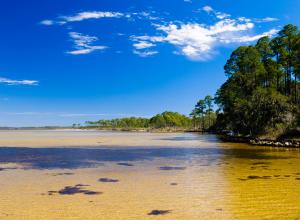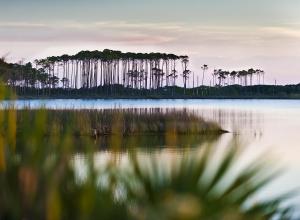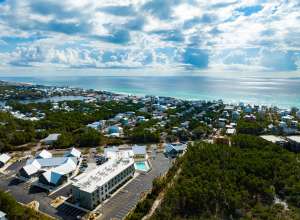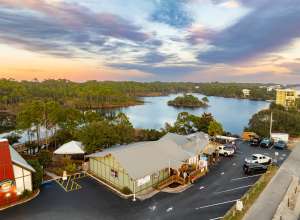Story
Sea Turtle Season Spans South Walton Summer
May 5, 2019 by SoWal Staff

Sea Turtle Season runs May 1 - October 31 in South Walton. Extra care is needed to help protect and preserve our ancient flippered friends during the season. Sea turtles have been nesting on our shores for millions of years.
South Walton Turtle Watch is a group of volunteers whose purpose is to locate endangered and threatened sea turtle nests and to protect them along the beaches of NW Florida during the crucial nesting and hatching season. By law, Only certified members are allowed to interact with endangered sea turtles.
The first sea turtle nest in Walton County is usually found around the third week in May. The nests are found by walking the beach early in the morning and looking for tracks left by the female when she comes ashore to nest. The tracks look like large tractor tracks that begin and end at the water line.
Nests are also monitored after eggs have been laid. Once a nest’s eggs hatch it is excavated 72 hours later, and any hatchlings left in the nest are released to the open sea. Empty egg shells are counted, and all conditions of the nest cavity are reported to the Florida Department of Environmental Protection (DEP).
The heart and soul of the South Walton Turtle Watch are the tireless, dedicated volunteers who walk the beach at dawn looking for tracks of sea turtles that came from the sea during the night to nest. Nests and false crawls are documented. Turtle Watch volunteers also monitor hatching nests, documenting the success rate.
Volunteers now include night walkers, monitoring potential lighting problems that cause lighting disorientation to hatchlings. Disorientation results in many hatchling deaths each year.
South Walton Turtle Watch needs your help. If you would like to walk the beach, or if you see a sea turtle, or sea turtle tracks, please call Sharon Maxwell at 897-5228, or call the Florida Marine Patrol, at 1-800-342-5367.
Here's your chance to help protect South Walton Sea turtles - join Friends of South Walton Sea Turtles!
Sea turtles, which are among the oldest creatures on earth, have remained essentially unchanged for 110 million years; however, they face an uncertain future. Illegal harvesting, habitat encroachment, and pollution (physical and light) are only some of the things sea turtles must face as each species struggles to stay alive.
FWC helps to protect and conserve marine turtles and their habitat through:
Division of Habitat and Species Conservation - Imperiled Species Management Section (ISM)
Fish and Wildlife Research Institute (FWRI)
Division of Law Enforcement (LE)
The management program (ISM) is primarily responsible for the management efforts of marine turtle recovery. Staff participate in decisions regarding coastal construction activities, land acquisition and management of nesting beaches and foraging habitats. Staff review and comment on permits for coastal construction activity, environmental resource permits, beach renourishment projects, beach lighting ordinances, and beach cleaning practices. Field evaluations of proposed and permitted activities are conducted to recommend and evaluate the success of marine turtle protection measures.
Coordination of research and management activities is accomplished through various means, including the administration of a marine turtle permit system. Through a cooperative agreement with the U.S. Fish and Wildlife Service, the FWC reviews, issues, and administers permits for both research and management activities conducted with marine turtles within the state. Staff also monitors marine turtles held in captive/holding facilities.
Laws:
Sea turtles are either endangered or threatened (the loggerhead is the only species that has a population high enough to be only threatened in Florida). They are protected under the Federal Endangered Species Act of 1973 and Florida's Marine Turtle Protection Act (379.2431, Florida Statutes).
Florida Statutes (F.A.C. Rule 68E-1) restrict the take, possession, disturbance, mutilation, destruction, selling, transference, molestation, and harassment of marine turtles, nests or eggs. Protection is also afforded to marine turtle habitat. A specific authorization from Commission staff is required to conduct scientific, conservation, or educational activities that directly involve marine turtles in or collected from Florida, their nests, hatchlings or parts thereof, regardless of applicant's possession of any federal permit.
The Florida Department of Environmental Protection and the Florida Fish and Wildlife Conservation Commission (FWC) dually review permits for coastal construction under Chapter 62B, Florida Administrative Code (F.A.C.). that affects Marine Turtles.
Regulations:
The state of Florida developed a model lighting ordinance (62B-55, F.A.C.) to guide local governments in creating lighting ordinances. The many counties and municipalities in Florida that have passed ordinances prohibiting light from reaching the beach can be found on the Municipal Code Corporation web site.
List of the Counties/Municipalities with these Ordinances
Map of the Counties/Municipalities with these Ordinances (1.7Mb)
Conservation Guidelines:
The Fish and Wildlife Conservation Commission (FWC) issues permits for activities involving marine turtles in Florida under authority granted to the state through a Cooperative Agreement with the U.S. Fish and Wildlife Service (USFWS) under Section 6 of the U.S. Endangered Species Act (ESA). All activities relating to marine turtles must be authorized under subsection379.2431(1), Florida Statutes.
Guidelines provide instruction to Florida marine turtle permit holders on acceptable research and conservation techniques.
A great way to help Sea Turtles and other Imperiled Species survive is to participate with beach and park or roadside cleanups in your area, volunteer your time to educate others and contribute to organizations who administer management, educational and research programs. The following list provides you with information about some ways you can participate or show your support.

















